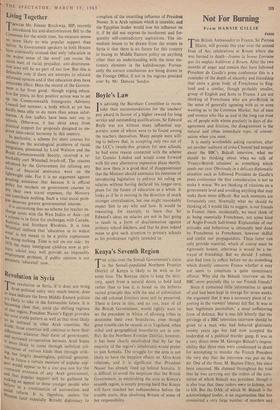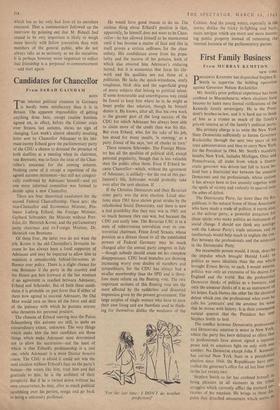Not For Burning
From DARSIE GILLIE
PARIS
rr HE British Ambassador to France, Sir Pierson I Dixon, will preside this year over the annual Joan of Arc celebrations at Rouen where she was burned to death—Jeanne la bonne Lorraine que les anglais briilerent a Rouen. After the two months of anger and tension that have followed President de Gaulle's press conference this is a reminder of the depth of sincerity and friendship that unite a great body of Frenchmen to Eng- land and a similar, though probably smaller, group of English and Scots to France. I am not thinking of Frenchmen who are pro-British in the sense of generally agreeing with us or even wanting us in the Common Market, but of men and women who like us and in the long run trust us, of people with whom precisely in days of dis- agreement and friction, the disagreement is the natural and often immediate topic of conver- sation when you meet.
It is surely worthwhile asking ourselves, after yet another outburst of cross-Channel bad temper about the BBC's Bidault interview, what we should be thinking about when we talk of 'Franco-British relations' as something which needs our care. Obviously in a delicate diplomatic situation such as followed President de Gaulle's press conference the first consideration is not to make it worse. We are thinking of relations on a government level and avoiding anything that may make them more difficult. But such moments are fortunately rare. Normally what we should be thinking of, I would like to suggest, is our friends in France; these, incidentally, we must think of as being essentially Frenchmen, not some kind of Anglo-French half-breed. ExplanatiOn of our attitudes and behaviour is ultimately best done by Frenchmen to Frenchmen, however skilful and useful our propagandists. These latter can only provide material, which of course must be rigorously honest, otherwise it would be a be- trayal of friendship. But we should, I submit, also find time to reflect before we do something which directly concerns France whether it may not seem to constitute a quite unnecessary offence. Why did the Bidault interview on the BBC seem precisely this to our French friends?
Since it contained little information to speak of and had been kept in storage for seven weeks, the argument that it was a necessary piece of re- porting in the viewers' interest fell flat. It was at best 'legitimate journalism,' a most unflattering form of defence. But it was felt bitterly that the privilege of a BBC television interview should be given to a man who had behaved gloriously twenty years ago but had now accepted the leadership of a political murder gang. It was in a very direct sense M. Georges Bidault's respon- sibility that three men were condemned to death for attempting to murder the French President the very day that the interview was put on the air. One of the three, M. Bastien-Thiry, has since been executed. He claimed throughout his trial that he was carrying out the orders of the com- mittee of which Bidault was president, though it is also true that these orders were to kidnap, not to kill. But the OAS, of which M. Bidault is the acknowledged leader, is an organisation that has committed a very large number of murders and which has so far only had four of its members executed. That a commentator followed up the interview by pointing out that M. Bidault had ceased to be very important is likely to weigh more heavily with fellow journalists than with members of the general public, who do not always take us as seriously as we do ourselves: It is perhaps however more important to reflect that friendship is a perpetual re-commencement —and start again.



































 Previous page
Previous page